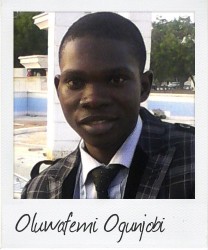“Family feud: dependence breaks families”
December 1st, 2015 Family ties are valuable supports, but as Oluwafemi Ogunjobi, 23, a Commonwealth Correspondent from Nigeria writes, they do not replace the need for personal responsibility.
Family ties are valuable supports, but as Oluwafemi Ogunjobi, 23, a Commonwealth Correspondent from Nigeria writes, they do not replace the need for personal responsibility.
Africans, especially, are not quick to forget the embittered family feud between sports personality Emmanuel Adebayor and his family – a story of a successful child, who did his best to save his family from hard times, but was taken advantage of until he had to burst out.
From a nuclear family of six, with extended relations, I know his story is credible and not an unusual one. Actually, it tends to be a common scenario within and outside Africa. You have that one person who is successful, and if they happen to come from a poor family or have relatives with extreme financial hardships, they become the bank rollers for these relatives. In fact, they are sucked dry to the bone – to the point where they feel their families and loved ones would even have the skins off their bodies, if they could.
I understand the African cultural set up so well, particularly for poor families whose bread-winner (usually the father) dies early. The other members are left shattered, and struggle their way through until there is another bread-winner. In many cases, the eldest child or whoever is successful in that household takes up the responsibility and cares for the mother and younger ones.
This is no bad thing, and indisputably families – your people – are an integral part of one’s life. They should be taken care of to the best of one’s abilities, but should not be dependent on one individual for the entire family’s survival.
In his Facebook rant goo.gl/nQbcvh, the former Arsenal man said he woke from a nap in his own house in France to find his brothers holding a knife to his throat, demanding money they felt he should give them. He had earlier made some cash sacrifices to save both his elder and younger siblings from hardship, and to help them have a life of their own. The Togolese striker accuses Rotimi, his younger brother, of stealing shirts signed by the late Marc-Vivien Foe and Zinedine Zidane, among other things, over the years. He refutes the accusation that he stole phones from a football academy in France, which Adebayor said he paid for, and said he funded Rotimi and a friend’s trip to Dubai to try to make a career, only for him to return after four days.
While growing up, my father taught me and my three siblings to be self-reliant, independent and responsible for ourselves. He narrates how he had to shoulder the heavy responsibilities of his family, as a first child, after their father’s demise. The burden was so much on him that it affected us – his children. When he could no longer bear it, the family members turned their backs on him. In their words, they said; ‘Our brother has changed.’
Such is Adebayor’s story. It typifies how dependence is killing African families. Some family members are parasites. They depend heavily on whoever is the bread-winner in their family, and fail to take responsibility for their own lives. In some extreme situations, when such bread-winners die, the family members gang up around his wealth and decide how it should be shared. Except with strong legal intervention in the distribution of wealth, such family members leave the deceased’s immediate family to suffer. They always claim that their ‘son’ laboured so hard for them to enjoy, because after all, blood is thicker than water.
The most important single concern in our society today is personal responsibility. Societal systems that encourage dependency destroy the capacity of individuals to achieve their own goals. It is not possible for someone else to be responsible for others.
Societal structures that encourage dependence harm the very society itself. One of the pillars of a free and sane society is personal responsibility. In order to be productive, individuals must think for themselves, pursue their truths as they know them, and earn their happiness. Independent thinkers who are innovative, creative, and personally responsible make human flourishing possible. Not pests.
Image URI: http://mrg.bz/SC0fZX
…………………………………………………………………………………………………
About me: I am a purpose-driven Nigerian, student, freelance writer, and youth development advocate. I am continuously involved in productive activities that affect human lives, purpose and dignity.
I am passionate about writing. I seek to bring global headliners together through it, and equally to demonstrate how passionate commitment to excellent reporting and storytelling makes a difference in the lives of people everywhere. I also love travelling and playing soccer.
…………………………………………………………………………………………………
Opinions expressed in this article are those of the author and do not necessarily represent the views of the Commonwealth Youth Programme. Articles are published in a spirit of dialogue, respect and understanding. If you disagree, why not submit a response?
To learn more about becoming a Commonwealth Correspondent please visit: http://www.yourcommonwealth.org/submit-articles/
…………………………………………………………………………………………………




